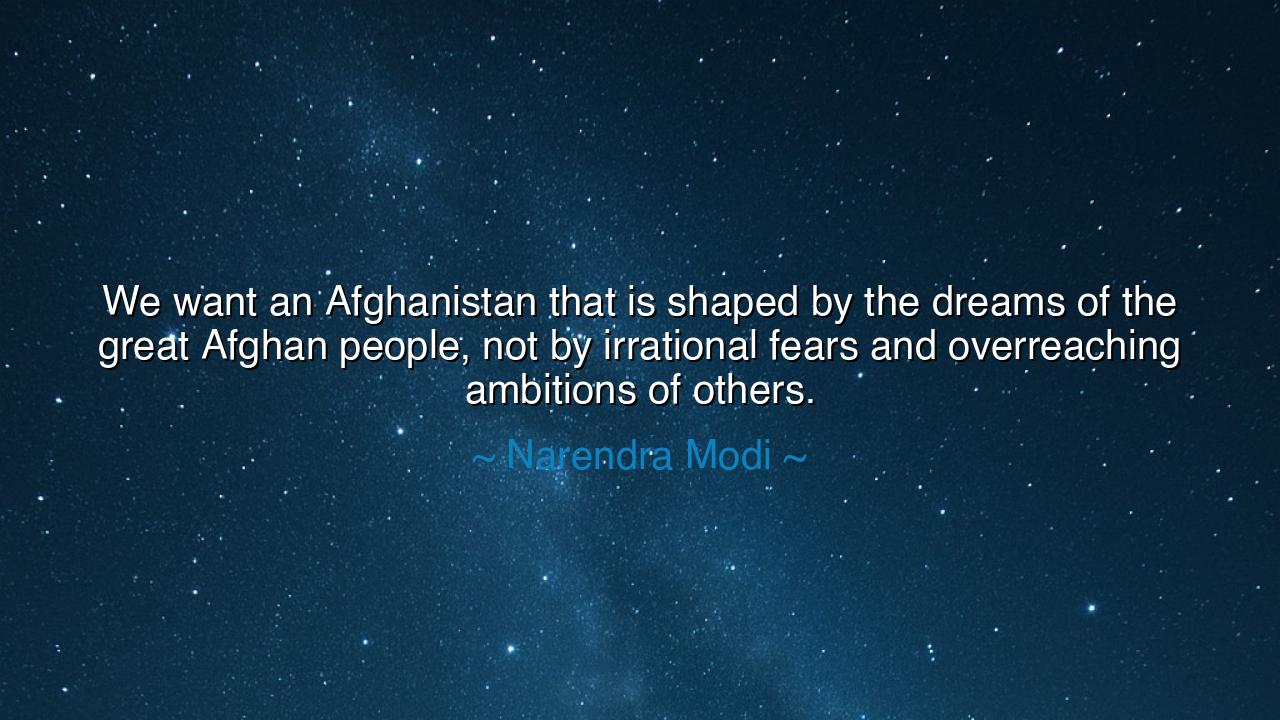
We want an Afghanistan that is shaped by the dreams of the great
We want an Afghanistan that is shaped by the dreams of the great Afghan people, not by irrational fears and overreaching ambitions of others.






The words “We want an Afghanistan that is shaped by the dreams of the great Afghan people, not by irrational fears and overreaching ambitions of others” were spoken by Narendra Modi, Prime Minister of India, during a time when the winds of uncertainty once again swept across the rugged mountains and ancient valleys of Afghanistan. His statement, though political in form, resonates with the eternal rhythm of truth—it is not merely a call for policy, but a plea for dignity, a defense of the sacred right of a people to dream their own destiny. In these words echo the timeless struggle of all nations: the longing to be free from domination, the yearning to shape one’s future not under the shadow of another’s ambition, but under the light of one’s own dreams.
To understand the depth of Modi’s statement, one must hear the heartbeat of Afghanistan itself. This land—once the crossroads of civilizations, once a cradle of poetry, trade, and valor—has long been scarred by the ambitions of outsiders. From the invasions of empires ancient and modern to the rivalries of powers great and small, Afghanistan has borne the burden of other nations’ fears and ambitions. Yet through every storm, the Afghan spirit has endured—its people bound not by empire or ideology, but by honor, courage, and hope. Thus, when Modi speaks of a nation shaped by its own dreams, he gives voice to a universal yearning: the desire of every people to live, to grow, to rebuild—not as pawns of power, but as authors of their own fate.
His reference to “irrational fears and overreaching ambitions” is a mirror held up to history. For it is fear—fear of difference, fear of loss, fear of weakness—that drives nations to dominate others. And it is ambition, unchecked and unwise, that turns neighbors into conquerors. In every age, these twin shadows have cast long darkness over the world. The story of Afghanistan is but one chapter in that great human tale—the struggle between freedom and control, between the dreamer and the despot. Modi’s words call not only for political wisdom but for moral clarity: that true peace cannot be built upon conquest, and that greatness does not arise from domination, but from the ability to let others flourish.
History offers many reflections of this truth. Consider India itself, whose struggle for independence was not born from hatred, but from the dream of self-determination—the same dream Modi invokes for Afghanistan. Mahatma Gandhi once said that freedom is the right to shape one’s destiny according to one’s conscience, not another’s desire. When the British Empire ruled through fear and ambition, India responded not with greater power, but with greater faith in truth. Likewise, Modi’s words suggest that Afghanistan, too, must be given that sacred space—to rise by its own will, to heal in its own way, to build upon its own dreams.
There is in his statement a tone both protective and prophetic. It is protective, because it calls upon the conscience of nations to respect Afghanistan’s sovereignty and humanity. It is prophetic, because it reminds us that no nation, however powerful, can impose lasting order upon another. The soil of every land blooms only under the care of its own people. Empires fall, but the will of a nation endures. As the ancients knew, even the smallest fire, tended by love and faith, can outlast the mightiest storm.
Yet these words reach beyond the borders of Afghanistan—they speak to every human being who has ever had their dreams overshadowed by the ambitions of others. Whether in nations, families, or within one’s own heart, we all face the struggle between the voice of our dreams and the noise of others’ expectations. To live authentically—to shape one’s own destiny—is to resist the tyranny of fear and ambition wherever it appears. Thus, Modi’s statement becomes not only a call for political independence, but for spiritual sovereignty, the right of every soul to pursue its path unhindered by the false promises of power.
Let this, then, be the teaching drawn from his words: honor the dreams that are born from within, and protect them from the shadows of fear and greed. Whether you are a person or a people, let your destiny be written by your own hand, not dictated by the ambitions of others. Build your life, your nation, and your world upon the foundation of dignity and respect—for only when dreams are self-made do they bear the fruit of peace.
And remember always that what Modi said of Afghanistan holds true for all humanity: the future belongs not to those who dominate through ambition, but to those who dare to dream with courage. For in the end, it is not conquest that endures, but creation—not fear that defines us, but the freedom to imagine, to build, and to believe in a destiny truly our own.






AAdministratorAdministrator
Welcome, honored guests. Please leave a comment, we will respond soon